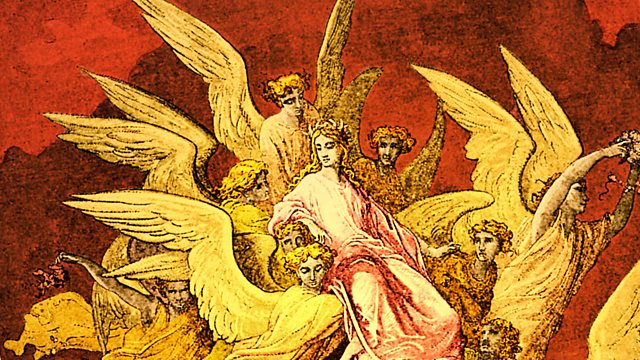
Dante and Blake: The Seven Deadly Sins
Poems by Dante and William Blake interspersed with music by Wagner, Janacek and Tchaikovsky. The readers are Ray Fearon and Aoife Duffin.
In his Divine Comedy, Dante Alighieri explores the cardinal vices of Pride, Envy, Wrath, Sloth, Covetousness, Gluttony and Lust. In his singular and influential model of the afterlife, he climbs the Mountain of Purgatory and encounters seven terraces, each home to penitents suffering torments according to their sin.
Another visionary poet, William Blake, was an equally individual artist and produced more than a hundred illustrations for Dante's masterwork. The themes of suffering and redemption, darkness and light, appealed to him as both painter and writer, and many of his poems match Dante for intensity and insight.
Extracts from Dante's Purgatory and Blake's Songs of Innocence and Experience are read by Ray Fearon and Aoife Duffin while music includes Wagner, Janacek, Tchaikovsky and Miles Davis.
Last on
More episodes
Previous
Music Played
Timings (where shown) are from the start of the programme in hours and minutes
-
Dante
Inferno, read by Ray Fearon
![]() 00:00
00:00Richard Wagner
Prelude (Parsifal)
Performer: Vienna Philharmonic, Georg Solti.- Decca 4406062.
- CD2 Tr4.
Dante
Purgatorio, read by Ray Fearon
![]() 00:03
00:03Ralph Vaughan Williams
Symphony no.2 (London)
Performer: LSO, Andre Previn.- RCA 82876557082.
- CD2 Tr3.
Blake
London, read by Aoife Duffin
![]() 00:11
00:11LASSUS
Lamentatio Tertia, Tertii Diei
Performer: Ensemble Europeen de la Chapelle Royale, Philippe Herreweghe.- Harmonia Mundi HMC901299.
- Tr9.
Dante
Purgatorio, read by Ray Fearon
![]() 00:18
00:18Leos Jan谩膷ek
Zarlivost
Performer: Czech Philharmonic, Jiri Belohlavek.- Chandos CHAN9080.
- Tr5.
Dante
My Pretty Rose Tree, read by Aoife Duffin
![]() 00:25
00:25Franz Schubert
Heidenroslein
Performer: Bryn Terfel, Malcolm Martineau.- DG 4452942.
- Tr13.
Dante
Purgatorio, read by Ray Fearon
![]() 00:27
00:27Giuseppe Verdi
Requiem: Dies Irae
Performer: Swedish Radio Chorus, Eric Ericson Chamber Choir, Berlin Philharmonic, Claudio Abbado.- EMI 5571682.
- CD1 Tr3.
Blake
A Poison Tree, read by Aoife Duffin
Dante
Purgatorio, read by Ray Fearon
![]() 00:33
00:33Miles Davis
Freddie Freeloader
- Sony 88697439232.
- Tr2.
Blake
The Schoolboy, read by Aoife Duffin
Dante
Purgatorio, read by Ray Fearon
![]() 00:40
00:40Felix Mendelssohn
Hor mein Bitten
Performer: Corydon Singers, Matthew Best.- Hyperion CDH55268.
- Tr16.
Blake
Letter, read by Aoife Duffin
![]() 00:46
00:46Leonard Bernstein
Mass: Meditation no.1
Performer: Mstislav Rostropovich, Israel Philharmonic, Leonard Bernstein.- DG 4159662.
- Tr10.
Dante
Purgatorio, read by Ray Fearon
![]() 00:52
00:52Roussel
Bacchus et Ariane: Bacchanale
Performer: 蜜芽传媒 Philharmonic, Yan Pascal Tortelier.- Chandos CHAN9494.
- Tr21-22.
Blake
Holy Thursday, read by Aoife Duffin
![]() 00:57
00:57Engelbert Humperdinck
Hansel und Gretel: Pantomine
Performer: Bavarian Radio SO, Donald Runnicles.- Teldec 4509945492.
- CD1 Tr17.
Dante
Purgatorio, read by Ray Fearon
![]() 01:04
01:04Schoenberg
Moses und Aron: Dance of the Butchers
Performer: Chicago SO, Georg Solti.- Decca 4142642.
- CD2 Tr4.
Blake
The Garden of Love, read by Aoife Duffin
![]() 01:09
01:09Pyotr Ilyich Tchaikovsky
Francesca da Rimini
Performer: CBSO, Andris Nelsons.- Orfeo C860111A.
- Tr1.
Producer's Note
In his Divine Comedy, Dante Alighieri explores the cardinal vices of Pride, Envy, Wrath, Sloth, Covetousness, Gluttony and Lust. In his singular and influential model of the afterlife, he climbs the Mountain of Purgatory and encounters seven terraces, each home to penitents suffering torments according to their sin. 聽Another visionary poet, William Blake, was an equally individual artist and produced more than a hundred illustrations for Dante鈥檚 masterwork. The themes of suffering and redemption, darkness and light, appealed to him as both painter and writer, and many of his poems match Dante for intensity and insight.
As Dante鈥檚 traveller starts his journey, with music from Wagner鈥檚 opera Parsifal, Pride and its mirror penitence come from Vaughan Williams (his London Symphony) and a penitential psalm from Lassus.聽 Janacek鈥檚 overture Jealousy is a concise and terse evocation of envy - as is Blake鈥檚 poem My Pretty Rose Tree, soothed only by Schubert鈥檚 tender Heidenroslein.聽聽Wrath here is the wrath of God: the Dies Irae from Verdi鈥檚 Requiem and a grim Wilfred Owen setting from Britten鈥檚 War Requiem. Miles Davis鈥檚 Freddie Freeloader is the epitome of sloth, deliciously lazy, while Blake鈥檚 view of covetousness as a religious infraction allows us to contract devotional Mendelssohn and almost sacrilegious Bernstein.聽聽The gluttony of a bacchanal (in this case from Roussel鈥檚 ballet Bacchus et Ariane) stands in grim contrast to the desperate hunger of the starved children in Humperdinck鈥檚 Hansel und Gretel; the lustful excess of Schoenberg鈥檚 Moses und Aron in orgiastic contrast with the Dantean passion of Tchaikovsky鈥檚 Francesca da Rimini and her lover.Broadcast
- Sun 24 Jul 2016 18:15蜜芽传媒 Radio 3


